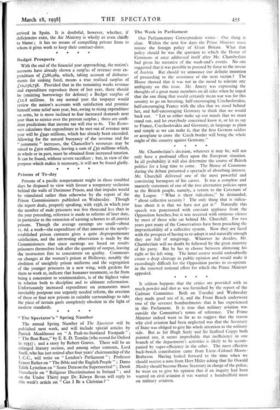Mr. Chamberlain's decision, whatever it may be, will not only
have a profound effect upon the European situation. In all probability it will also determine the course of British politics for a long time to come. The House of Commons during the debate presented a spectacle of absorbing interest. Mr. Churchill delivered one of the most powerful and convincing harangues of his career. It was a complete and masterly statement of one of the two alternative policies open to the British people, namely, a return to the Covenant of the League. " What is there ridiculous," he demanded, " about collective security ? The only thing that is ridicu- lous about it is that we have not got it." Naturally this speech was punctuated with constant applause from the Opposition benches, but it was received with ominous silence by most of those who sat behind Mr. Churchill. For two years past many of the Conservatives have been preaching the impracticability of a collective system. Now they are faced with the prospect of having to re-adopt it and naturally enough they are full of misgivings. Whatever he decides, Mr. Chamberlain will no doubt be followed by the great majority of his party. But he has to choose between alienating his right or his left wing. The latter course would undoubtedly create a deep cleavage in public opinion and would make it exceedingly difficult for the Opposition parties to co-operate in the renewed national effort for which the Prime Minister appealed.
* * * *














































 Previous page
Previous page